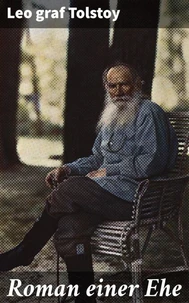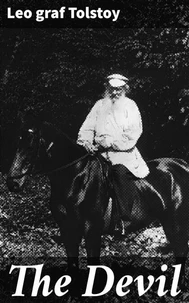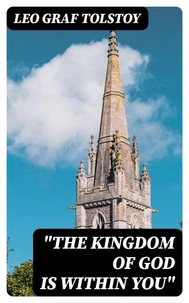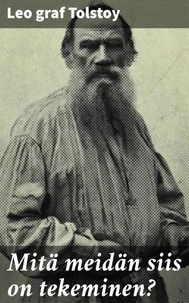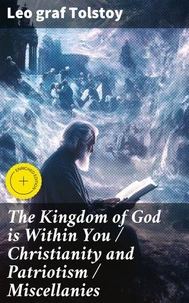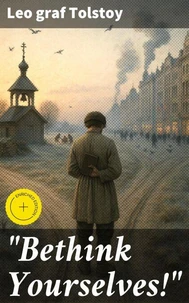What to Do? Thoughts Evoked By the Census of Moscow. Exploring Existential Reflections and Moral Dilemmas in 19th Century Moscow
Par : ,Formats :
Disponible dans votre compte client Decitre ou Furet du Nord dès validation de votre commande. Le format ePub est :
- Compatible avec une lecture sur My Vivlio (smartphone, tablette, ordinateur)
- Compatible avec une lecture sur liseuses Vivlio
- Pour les liseuses autres que Vivlio, vous devez utiliser le logiciel Adobe Digital Edition. Non compatible avec la lecture sur les liseuses Kindle, Remarkable et Sony
 , qui est-ce ?
, qui est-ce ?Notre partenaire de plateforme de lecture numérique où vous retrouverez l'ensemble de vos ebooks gratuitement
Pour en savoir plus sur nos ebooks, consultez notre aide en ligne ici
- Nombre de pages211
- FormatePub
- ISBN4057664595409
- EAN4057664595409
- Date de parution25/04/2021
- Protection num.Digital Watermarking
- Taille530 Ko
- Infos supplémentairesepub
- ÉditeurGOOD PRESS
Résumé
In "What to Do? Thoughts Evoked By the Census of Moscow, " Leo Tolstoy navigates the complexities of societal morality through a profound examination of the results of the 1897 Moscow Census. This essay reflects Tolstoy's characteristic literary style, marked by an incisive analysis and a deep questioning of the moral fabric of society. He juxtaposes statistics with the stark realities of human suffering, urging readers to confront the ethical implications of economic and social structures.
The work is set against the backdrop of late 19th-century Russia, a period rife with social upheaval and a growing consciousness of class disparities, underscoring the urgency of Tolstoy's message. Tolstoy, renowned for his epic novels like "War and Peace" and "Anna Karenina, " was not only a literary giant but also a fervent social reformer. His experiences with the societal inequities he portrayed in his fiction influenced his philosophical outlook, leading him to advocate for a simpler, more compassionate way of life.
This essay is a culmination of his ethical musings and reflections on his own existential dilemmas, borne from his interactions with both the elite and the impoverished. This thought-provoking work is highly recommended for readers interested in moral philosophy and social critique. Tolstoy's insights resonate with contemporary discussions on inequality and human dignity, prompting reflection on the reader's personal role within society.
"What to Do?" serves as both a mirror and a call to action, encouraging a reevaluation of values in a swiftly changing world.
The work is set against the backdrop of late 19th-century Russia, a period rife with social upheaval and a growing consciousness of class disparities, underscoring the urgency of Tolstoy's message. Tolstoy, renowned for his epic novels like "War and Peace" and "Anna Karenina, " was not only a literary giant but also a fervent social reformer. His experiences with the societal inequities he portrayed in his fiction influenced his philosophical outlook, leading him to advocate for a simpler, more compassionate way of life.
This essay is a culmination of his ethical musings and reflections on his own existential dilemmas, borne from his interactions with both the elite and the impoverished. This thought-provoking work is highly recommended for readers interested in moral philosophy and social critique. Tolstoy's insights resonate with contemporary discussions on inequality and human dignity, prompting reflection on the reader's personal role within society.
"What to Do?" serves as both a mirror and a call to action, encouraging a reevaluation of values in a swiftly changing world.
In "What to Do? Thoughts Evoked By the Census of Moscow, " Leo Tolstoy navigates the complexities of societal morality through a profound examination of the results of the 1897 Moscow Census. This essay reflects Tolstoy's characteristic literary style, marked by an incisive analysis and a deep questioning of the moral fabric of society. He juxtaposes statistics with the stark realities of human suffering, urging readers to confront the ethical implications of economic and social structures.
The work is set against the backdrop of late 19th-century Russia, a period rife with social upheaval and a growing consciousness of class disparities, underscoring the urgency of Tolstoy's message. Tolstoy, renowned for his epic novels like "War and Peace" and "Anna Karenina, " was not only a literary giant but also a fervent social reformer. His experiences with the societal inequities he portrayed in his fiction influenced his philosophical outlook, leading him to advocate for a simpler, more compassionate way of life.
This essay is a culmination of his ethical musings and reflections on his own existential dilemmas, borne from his interactions with both the elite and the impoverished. This thought-provoking work is highly recommended for readers interested in moral philosophy and social critique. Tolstoy's insights resonate with contemporary discussions on inequality and human dignity, prompting reflection on the reader's personal role within society.
"What to Do?" serves as both a mirror and a call to action, encouraging a reevaluation of values in a swiftly changing world.
The work is set against the backdrop of late 19th-century Russia, a period rife with social upheaval and a growing consciousness of class disparities, underscoring the urgency of Tolstoy's message. Tolstoy, renowned for his epic novels like "War and Peace" and "Anna Karenina, " was not only a literary giant but also a fervent social reformer. His experiences with the societal inequities he portrayed in his fiction influenced his philosophical outlook, leading him to advocate for a simpler, more compassionate way of life.
This essay is a culmination of his ethical musings and reflections on his own existential dilemmas, borne from his interactions with both the elite and the impoverished. This thought-provoking work is highly recommended for readers interested in moral philosophy and social critique. Tolstoy's insights resonate with contemporary discussions on inequality and human dignity, prompting reflection on the reader's personal role within society.
"What to Do?" serves as both a mirror and a call to action, encouraging a reevaluation of values in a swiftly changing world.



